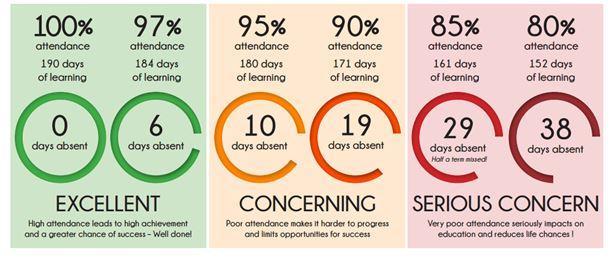Attendance
Regular attendance at school promotes children’s well-being and gives them the best chance of learning and reaching their potential. Children should attend school every day the school is open unless the reason for the absence is unavoidable.
Good attendance is important because children:
- get on better with learning and other children;
- cope better with school routines, work and friendships;
- find learning easier because they do not miss out;
- are more successful moving between primary school, secondary school, higher education and employment or training;
- are known to be safe and well by us.
Research shows a direct link between high attendance and doing well at school. All children have the right to an education. We encourage and expect 100% attendance for all children.
We will:
- tell children and parents the importance of being at school.
- check pupils are at school every day.
- follow up and check the absence of persistent non-attenders;
- phone home on the first day of absence to check where absent children are
- follow up an explained absence by phone call and email, and meetings for persistent absentees
- aim for an attendance rate of at least 96.5%. Children who are under school age, in Nursery or Reception, are treated in the same way as all other children;
- monitor school attendance data of individuals and groups and target our support towards removing barriers to attendance for individuals and groups who need it most;
- discuss poor attendance with parents to understand any barriers the pupil or family might be facing;
- facilitate support for families to help remove identified barriers to attendance. This could include support through the local authority attendance team, access to early help, such as parenting support, SEN support or Cumberland Children's Services;
- where absence persists and support offered is not being engaged with, we will communicate the consequences to parents. This may include formalising support through a parenting contract or education supervision order.
- when all avenues of support have been exhausted and support has not worked or being engaged with, the Local Authority can enforce attendance through a statutory intervention or prosecution to protect a child's right to an education;
- ensure that we adhere to the Children’s Services School Absence Enforcement Policy and DfE School Attendance Statutory guidance and departmental advice
- share and discuss attendance data with the Governing Board on a termly basis.
Parents:
- ensure their child attends school every day unless there is a genuine reason for absence.
- ensure your child is not late for school.
- contact the school either by telephone, in person, text, email or via parent mail before 8.45 a.m. on the first day of absence and regularly thereafter
- provide the school with accurate and up-to-date contact details (minimum of 2 emergency contacts) and update the school if details change
- endeavour to make health appointments, doctor, dentist, hospital appointments etc. at the end of the school day, thus allowing at least half a day’s education. Do not allow your child to be absent for a whole day when their medical appointment is only a short, local one
- inform a member of school staff of any reason or problem that may hinder their child from attending school
- avoid taking your child out of school for non-urgent matters
Children should arrive and be collected from school on time:
- registration is at 8:50 a.m., for all children from Nursery to Year 6. Our doors open at 8:45 a.m. to allow parents and carers to drop children off at school.
- registration closes at 9.15 a.m. arrival after this time is an 'unauthorised absence'. Late arrivals can cause children to feel anxious or upset;
- if a child is collected late, after 4:00 p.m. they join our After School Club. We charge a fee for this childcare;
- we take the view there are no late children, only late parents;
- we contact parents of children who have patterns of lateness to talk about how to arrive and/or be collected on time.

